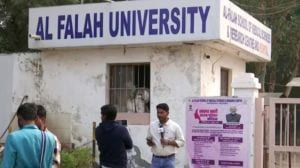BARELY two years after he founded it, Ghulam Nabi Azad may have dealt a debilitating blow to his already rocky Democratic Progressive Azad Party (DPAP).

In a statement to a local news agency in Srinagar that followed, Azad made it official. Saying he regretted his inability to campaign for DPAP candidates, Azad said: “The unforeseen circumstances have forced me to step back from the campaign trail… The candidates should assess whether they can continue without my presence. If they feel my absence would impact their chances, they have the freedom to withdraw their candidacy.”
Story continues below this ad
On Tuesday, 13 candidates filed their nominations on the DPAP ticket for the first phase of the polls to be held on September 18 for 24 seats. While their fate now hangs in the balance, no one is sure whether there will be any lists for the next two phases of voting, to be held on September 25 and October 1.
One of the DPAP candidates in the coming elections is Advocate Saleem Parray, who has filed his nomination from Dooru. Parray told The Indian Express that he had come to know of Azad’s statement from the press. But there was “no official communication as of now”, he said.
DPAP chief spokesperson Salman Nizami told The Indian Express: “Azad sahib has said that since he can’t campaign because of health issues, if any candidate feels he can’t continue in his absence, he is free to withdraw his candidature.” In what seemed a bid to keep the party morale up, Nizami added: “He has said this for the first phase, for which the last date of withdrawal is Friday.”
However, even the most ardent Azad well-wisher would be hard pressed to spot a silver lining for the DPAP now. The party never really took off after its formation in September 2022, and the Assembly elections were the first real opportunity for Azad – a former Congress veteran who walked out of the party cursing the Gandhi family, after years of being a loyalist – to prove his mettle.
Story continues below this ad
As the Congress’s biggest face in J&K, particularly a Muslim face from the Hindu-majority Jammu region, and as a former Chief Minister, Azad held much promise. Which was why the DPAP attracted several top leaders of the Congress at the start. Almost all have now returned to the Congress or are weighing their options as Independents.
While Azad expelled three senior leaders – former Deputy CM Tara Chand, ex-minister Manohar Lal Sharma and former MLA Balwan Singh – within three months of the DPAP’s launch, others kept leaving. These included ex-minister and DPAP vice-president Abdul Rashid Dar, Sham Lal Bhagat, Naresh Gupta and the president of the party’s women’s wing for Kashmir, Saima Jan.
In the recent Lok Sabha elections, the weakened DPAP flopped completely in the Anantnag-Rajouri and Udhampur-Doda constituencies where it put up candidates. Both its nominees lost their security deposits, not managing to take the lead in even one of the 36 Assembly segments in the two parliamentary seats.
Then too, Azad had dealt his party a shock just ahead of the polls by going back on the decision to contest from the Anantnag-Rajouri Lok Sabha seat himself. As a constituency that includes parts of both Jammu and Kashmir provinces post-delimitation, it was an ideal seat for Azad.
Story continues below this ad
A new round of exodus started after the Lok Sabha poll setback. Senior DPAP leader Taj Mohiuddin and tribal leader Haroon Khatana left recently.
On Tuesday, Azad loyalist Ghulam Mohammad Saroori sprang a surprise by announcing that he was filing his nomination as an Independent from the Inderwal Assembly segment of Kishtwar. The party candidate from the Udhampur-Doda seat in the recent Lok Sabha elections, Saroori took the step after being denied a ticket from Inderwal.
Along with former minister Abdul Majeed Wani, Saroori had been the only senior face in the Chenab region of Jammu, which is Azad’s stronghold, to side with him.
In recent days, it had been clear that the DPAP was struggling to find strong candidates. This was one reason the party fielded only 13 candidates in the first phase – six in the Jammu region and seven in South Kashmir – skipping 11 seats.

































